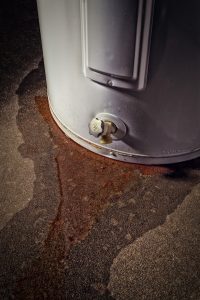
“Rust” and “water heater” aren’t words you want to see together. In general, you don’t want rust or other forms of corrosion to appear on any metal, since it weakens it. Metal in contact with water is in danger of corrosion, provided it’s also exposed to oxygen. Because rust cannot be reversed, only removed, once it starts, conventional wisdom about rust and water heaters is that once there’s corrosion starting, a water heater is finished. Time for a new one.
Is this always the case? If you see rust on your water heater, does it mean it’s time to call us to replace it? Let’s take a closer look at corrosion and water heaters.
Water heaters are designed to resist corrosion
Water heaters would rust and corrode fast if they weren’t designed with safeguards to prevent it. After all, this is a metal device that holds volumes of water. The standard water heater has several defenses that stop corrosion:
- Glass lining: The interior of a water heater tank has a glass lining to prevent direct contact between the tank water and the metal.
- Lack of oxygen in the tank: For corrosion to occur, water and metal must be in contact in the presence of oxygen. Otherwise, the oxidation that causes corrosion cannot happen. Modern water heaters are kept airtight to keep oxygen from the tank.
- Sacrificial anode rod: This is an important component of water heaters—a rod made of two different metals that runs from the top to the bottom of the tank. The rod draws corrosion toward it and starts to rust through rather than the tank. I.e. it “sacrifices” itself to corrosion so the water heater won’t corrode. The rod must be replaced every few years during maintenance when it completely corrodes.
If you keep up with routine maintenance for your water heater, it should be able to resist corrosion for most of its service life.
But when rust does happen…
When a rusting water heater needs to be replaced
Small spots of rust appearing on the heat exchanger for the water heater do not necessarily mean the water heater is finished. The heat exchanger can be replaced, although if the water heater is already over 20 years old, it’s probably just better to have a new one installed than pay the expense necessary for a new heat exchanger.
If rust is appearing on the tank, however, it indicates that rust is more widespread, and the water heater can’t come back from this. If you see a reddish-brown discoloration coming from the hot water taps, this means the hot water tank has already extensively rusted from the inside and it’s definitely time to call us to replace the water heater. If you’ve kept up with maintenance, the water heater will probably only reach this stage with advanced age and it’s already long past time for a new one.
We work with many types of water heaters in Maryland; you can trust us to find a great replacement for your rusted older model.
At Atlantic Refrigeration & Air Conditioning, Inc. “We Take Pride in Your Comfort!” Schedule water heater service today.
